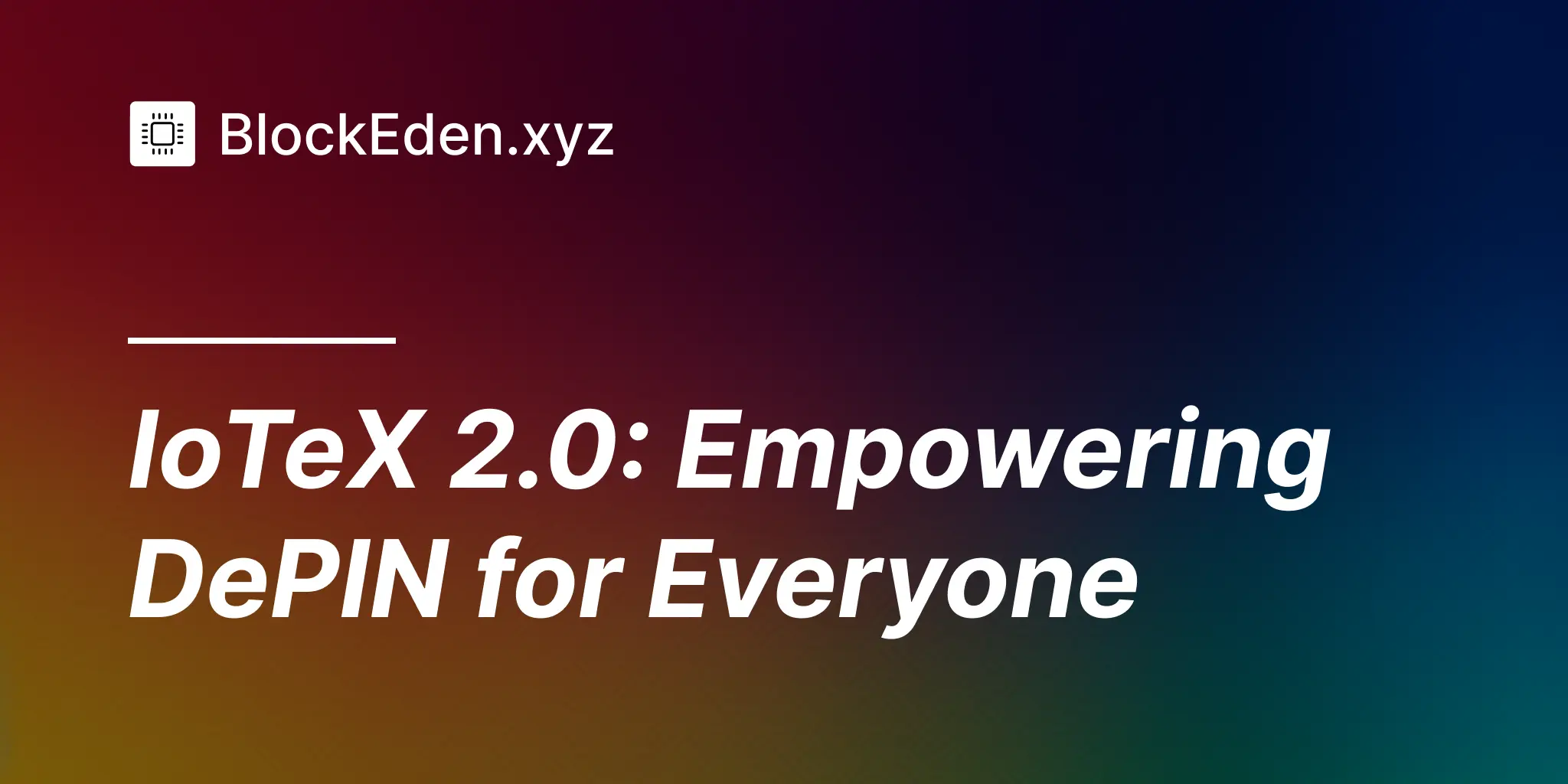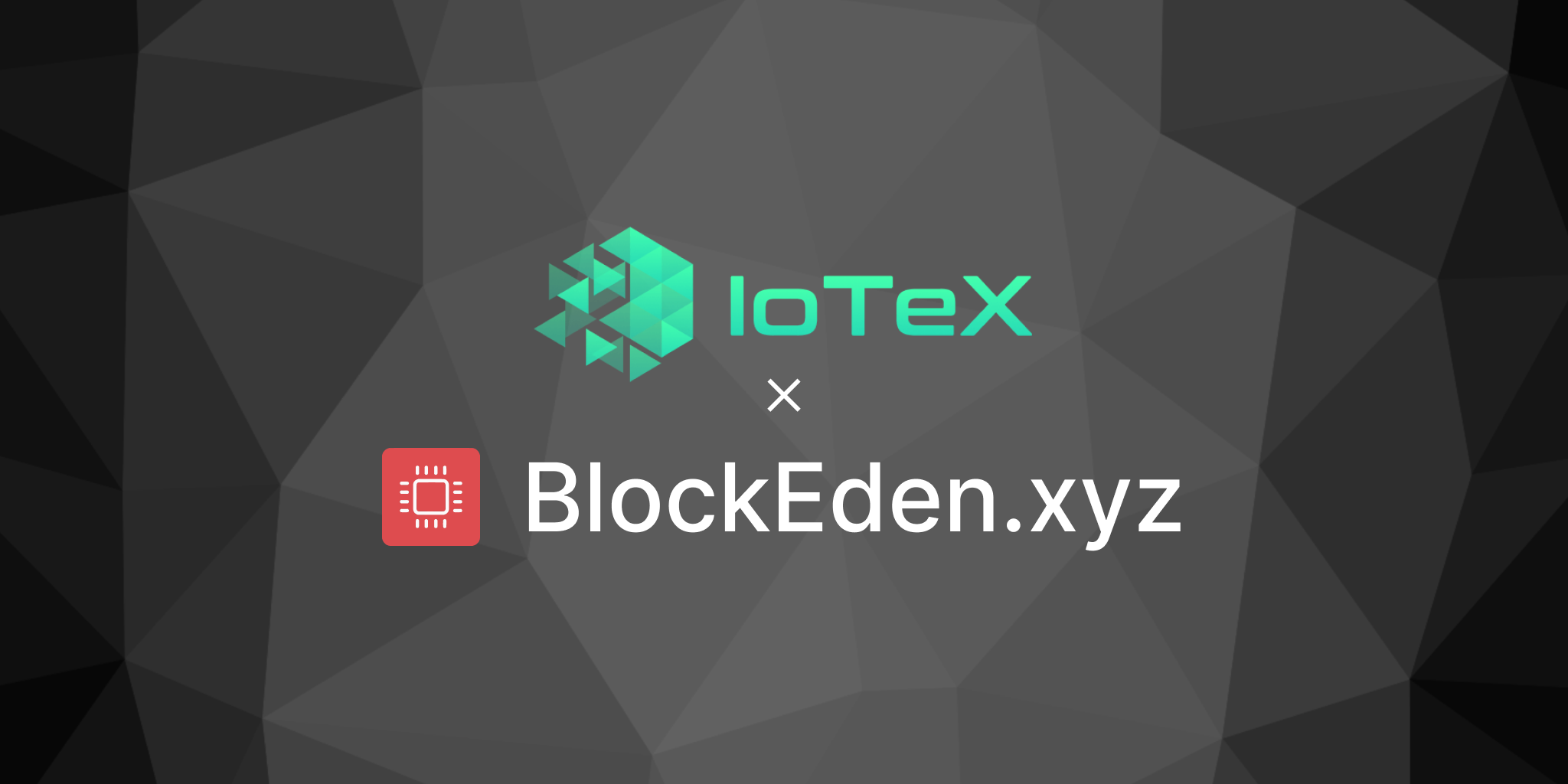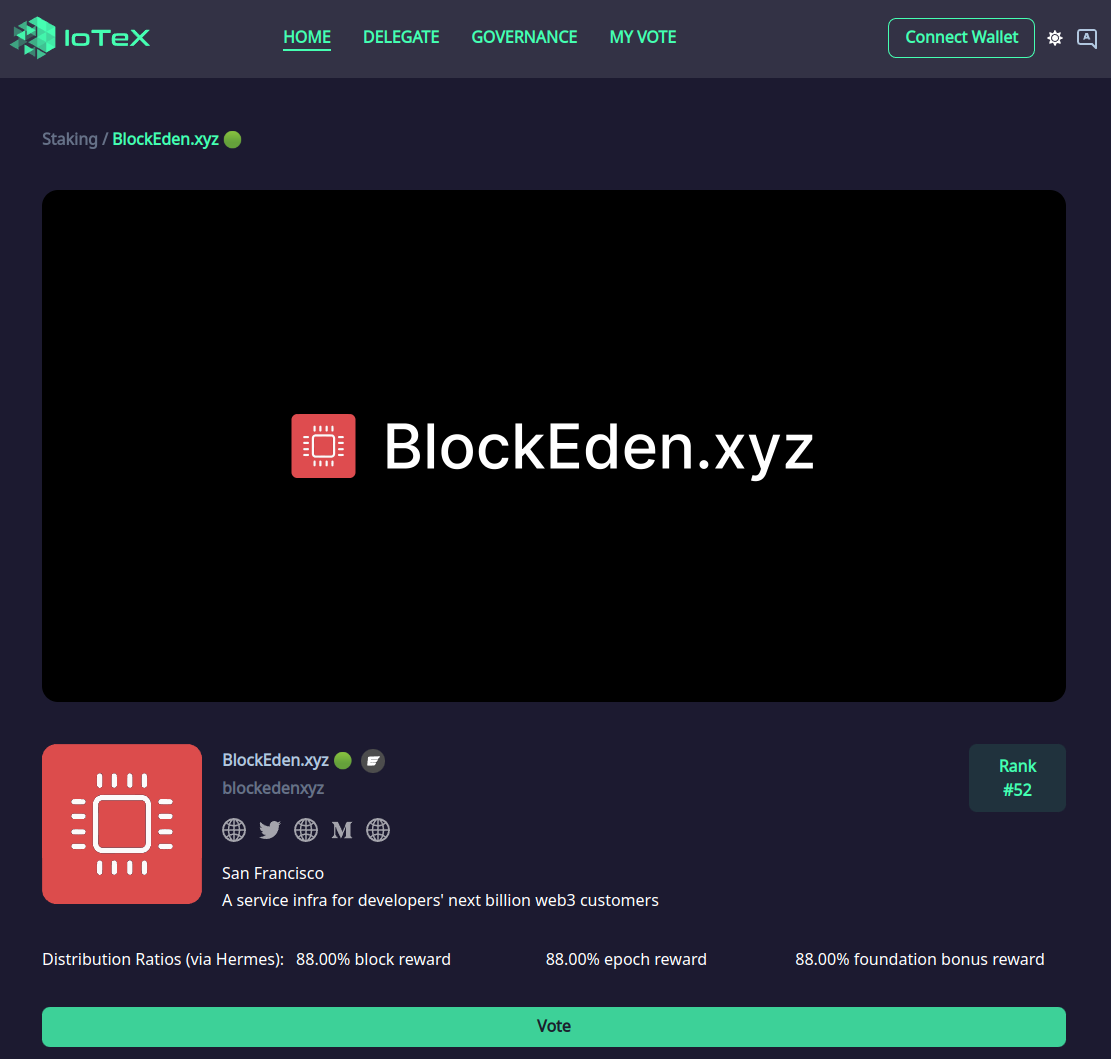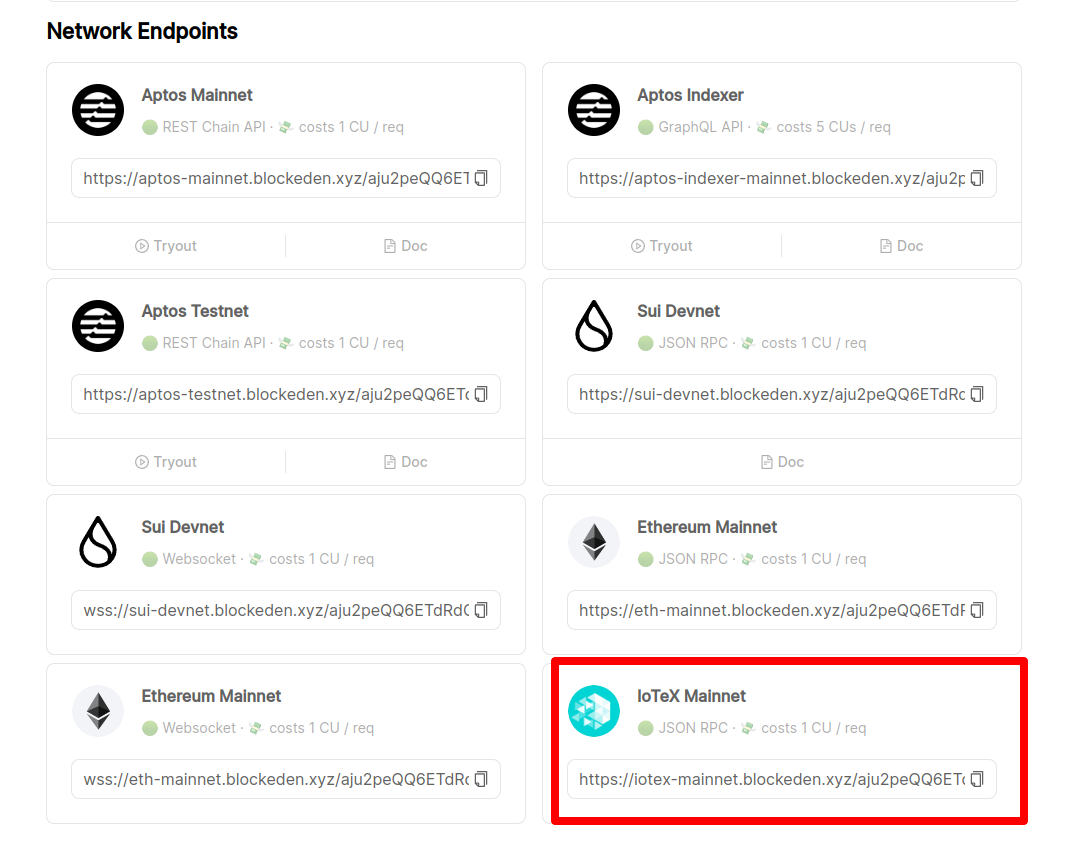IoTeX 2.0: DePIN für alle stärken
Dezentrale physische Infrastrukturnetzwerke (DePIN) entwickeln sich zu einer transformativen Kraft in der Web3-Landschaft und bieten ein neues Paradigma für den Aufbau, den Betrieb und die Verwaltung physischer Infrastrukturnetzwerke. Viele DePIN-Startups stehen jedoch aufgrund mangelnder Finanzmittel und technischer Kompetenz vor erheblichen Herausforderungen. IoTeX 2.0 zielt darauf ab, diese Herausforderungen mit einer Reihe von Innovationen zu bewältigen, die darauf ausgelegt sind, die DePIN-Community bei der Verwirklichung der Vision "DePIN für alle!" zu unterstützen.

Kerninnovationen von IoTeX 2.0
-
Tokenomic-Design:
- Ein umfassender Nutzen für IOTX-Token innerhalb der modularen DePIN-Infrastruktur.
- Inflationäre Staking-Belohnungen, deflationäre Burning-Mechanismen und Wachstumsanreize zur Aufrechterhaltung eines ausgewogenen Token-Angebots.
-
Modulare DePIN-Infrastruktur:
- Modularer Sicherheitspool (MSP): Bietet eine vereinheitlichte Vertrauensschicht für DePIN-Infrastrukturmodule durch Restaking.
- W3bstream: Ein dezentrales Multi-Prover-Netzwerk für die DePIN-Verifizierung, das verschiedene Ansätze für Gültigkeitsnachweise unterstützt.
- ioID: Ein vereinheitlichtes Identitätssystem, das Maschine-zu-Maschine- und Maschine-zu-Person-Beziehungen verwaltet und sichert.
- ioConnect: Ein universelles eingebettetes SDK, das die Geräteabstraktion ermöglicht und die Interaktion mit intelligenten Geräten erleichtert.
- ioDDK: Ein Chain-SDK, das DePIN-Projekten die Bereitstellung selbstsouveräner Anwendungs-Chains ermöglicht, die die IoTeX L1-Sicherheit erben.
-
Öffentliche Güter:
- Tools wie DePINScan und DePIN Liquidity Hub zur Unterstützung der Bekanntheit, Benutzerfreundlichkeit und Liquidität für DePIN-Projekte.
Die Bedeutung von DePIN
DePIN zielt darauf ab, traditionelle Industrien und öffentliche Versorgungsunternehmen zu stören, die oft Monopole sind, die von zentralisierten Unternehmen und Regierungen kontrolliert werden. Durch die Nutzung der Blockchain-Technologie kann DePIN Transparenz, Vertrauen und Innovation in die physische Infrastruktur und öffentliche Versorgungsunternehmen bringen. Dieses neue Modell ermöglicht es Menschen, zu realen Infrastrukturnetzwerken beizutragen und Eigenkapital aufzubauen, wodurch finanzielle und logistische Eintrittsbarrieren überwunden werden.
Die DePIN-Landschaft
DePIN ist eine gemeinsame Anstrengung zahlreicher Projekte auf der ganzen Welt, die sich auf die Dezentralisierung und Verbesserung der physischen Infrastruktur konzentrieren. Der DePIN-Sektor umfasst:
- Physische Ressourcennetzwerke: Produzieren nicht-fungible Ressourcen, die auf standortabhängiger Hardware basieren.
- Digitale Ressourcennetzwerke: Produzieren Marktplätze für fungible Ressourcen, die auf standortunabhängiger Hardware basieren.
- Infrastruktur und Tools: Fördern das Wachstum und bieten sofort einsatzbereite Funktionen für DePIN-Anwendungen.
Der DePIN-Tech-Stack und seine Herausforderungen
Der DePIN-Tech-Stack erfordert eine End-to-End-Architektur, die die reale Welt mit der Blockchain verbindet. Dies umfasst Schichten wie Hardware-Abstraktion, Konnektivität, Sequenzer, Datenverfügbarkeit, Langzeitspeicherung, Off-Chain-Computing, Blockchain, Identität und Governance. Die Entwicklung dieses komplexen Stacks stellt hohe Eintrittsbarrieren dar, insbesondere für Schwellenmärkte.
IoTeX 2.0: Ein modularer Ansatz
IoTeX 2.0 führt eine modulare Infrastruktur ein, die es DePIN-Projekten ermöglicht, einen Tech-Stack aufzubauen, der ihren spezifischen Anforderungen entspricht. Dieser Ansatz unterstützt sowohl große als auch kleine Teams, indem er umfassende und zweckgebundene Lösungen bereitstellt. Zu den Schlüsselkomponenten gehören:
- Modularer Sicherheitspool (MSP): Gewährleistet ein vereinheitlichtes und durchgängiges Vertrauen über DIMs hinweg, indem gestakte Assets von etablierten Blockchains genutzt werden.
- W3bstream: Ermöglicht dezentrales Off-Chain-Computing mit mehreren Provern, wodurch die Skalierbarkeit und Effizienz von DePIN-Anwendungen verbessert wird.
- ioID und ioConnect: Vereinfachen das Identitätsmanagement bzw. die Hardware-Abstraktion und ermöglichen eine nahtlose Integration intelligenter Geräte in DePIN-Projekte.
- ioDDK: Unterstützt den Start selbstsouveräner L2-Blockchains und erweitert die Fähigkeiten von DePIN-Projekten.
Zukunftsausblick
IoTeX 2.0 zielt darauf ab, eine neue Welt zu schaffen, in der physische Infrastrukturnetzwerke dezentralisiert, transparent und gerecht sind. Durch die Nutzung modernster Technologien wie Zero-Knowledge-Proofs, KI und Blockchain envisioniert IoTeX 2.0 eine Zukunft, in der intelligente Geräte, autonome Systeme und digitale Ressourcenmärkte nahtlos und sicher funktionieren. Diese Vision befähigt alltägliche Menschen, zur Modernisierung der globalen Infrastruktur beizutragen und davon zu profitieren, um "DePIN für alle!" zu gewährleisten.
Zusammenfassung
IoTeX 2.0 ist ein bedeutender Meilenstein in der Entwicklung des IoTeX-Netzwerks, der die Herausforderungen von DePIN-Startups angeht und die nächste Wachstumsphase für dezentrale physische Infrastrukturnetzwerke vorantreibt. Mit seiner innovativen modularen Infrastruktur, umfassenden Tokenomics und seinem Engagement für öffentliche Güter ist IoTeX 2.0 bereit, die DePIN-Bewegung anzuführen und Entwickler weltweit zu stärken. Sind Sie ein IoTeX-Entwickler? BlockEden.xyz bietet IoTeX RPC unter https://blockeden.xyz/api-marketplace/iotex an.


